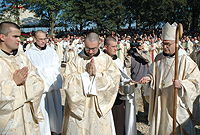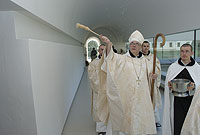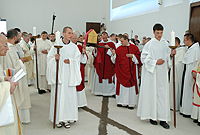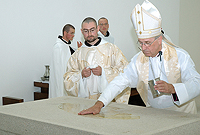Dedication of the church
(Excerpts of sermons pronounced during the Dedication.)
This church was not yet consecrated; but already an impulse lifted up its tons of steel and concrete – and our heavy step. These walls can pull us up above ourselves: they call for a presence, a meeting. Yes, this will one day be a sacred place, dreadful, a door to the sky, a place of struggle and of peace.
Of the peace that only the meeting with God can give, the friendship received over time, in the encounter with that strong and mysterious divine Presence in the Eucharist.
But a struggle as well, because we must stand before God. Vanquish God in a harder combat than in the battles with men. Last all night long, like Jacob in the struggle with the angel, until we get from Him the benediction that will pour out on all the sons of Israel.
May a line of fighters worthy of the great friends of God begin here.
–––
Prayer does not satisfy itself with a rapid meeting, with a furtive contact in which, after having given the news of one's self, one passes on. Prayer is above all relationship, presence, long waiting. It is the achievement of the saying of Our Lord: Rest in me! That demand necessarily requires a place where we like to pass long moments.
Prayer likes as well to give praise, to take up again in the psalms the words which come from God, to give them back to Him in putting all the beauty that the human heart is capable of giving.
–––
In a trampled, dechristianised and secularized country, one would logically expect the foundation of an apostolical convent having a charitable end; and yet we come with a monastery, a church built from the ground up, an enclosure. Certainly, there is an act of faith in this that not everyone can understand. There is even more: our monastic life, which we strive to live poorly and seriously in a western world, pagan in the east as in the west, consists in the unique praise of God and in the intercession for mankind. A limited comprehension but that we know in faith the extraordinary and mysterious extension. The Constitutions of our Order express this even better: a secret and mysterious apostolical fertility.
–––
In the context of the actual dechristianisation, one often hears: The absolute priority ought to be given, even for the religious, to apostolic work, the contemplative work will come after! This might appear to be a reflection of common sense, but in reality it is a shortsighted judgment that translates for the least pusillanimity of faith. We have known and we know what are societies without art, or even worse, with an art imposed by an ideology. They result in a debased, sterilized people. It is the same for the Church without prayer.




